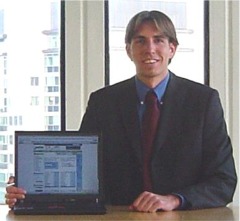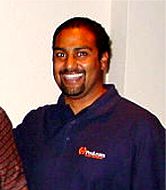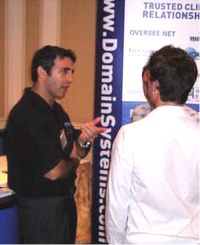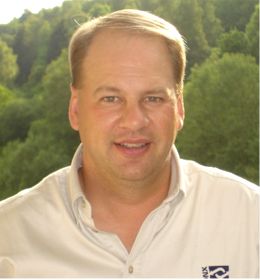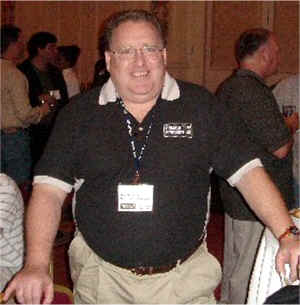

![]()

|
|
|||||||||||||||||||||||||
| The State of the Industry (Summer 2005): Where We Are and Where We Are Headed | |||||||||||||||||||||||||
By Ron
Jackson
Throughout my career in TV, radio and print journalism the one assignment I always hated most was doing the annual Year in Review report. Talk about boring. I mean that stuff had just happened! Unless you had been in a coma for the past 12 months, you already knew about everything that would be in the story! People working in newsrooms around the world know that those productions have nothing to do with �news� and everything to do with creating �filler� material to use when most of the staff is off for the holidays. |
|
What Lies
Over the Horizon For Domainers? |
|||||||||||||||||||||||
|
That being the case, it was with great reluctance that I decided to do our 2004 Year in Review article last January. It was such a monumental turnaround year for the industry, I felt I had no choice but to hold my nose and do the �review� thing despite my built-in prejudice against the format. Boy am I glad I did that! Thanks to the remarkable depth of talent we have in this industry, the people we interviewed transcended the mundane format and provided unusually cogent insight into what had happened in 2004, where we were as an industry at that point in time and most important of all, where we were headed. It rightfully became one of the best received articles we have run and it left many, including me, hungering for more. More
than six months later, with this industry continuing to change at an
incredibly rapid pace, I decided we couldn�t wait a full year to
find out where our industry leaders thought we were now and where
the domain highway was leading with the critical fourth quarter just
over the horizon. So we rounded up a dozen of the brightest lights
from various sectors of the business to give us their prognosis now
that we are getting ready to head down the home stretch for 2005.
After listening to what they had to say I�m convinced that this
�state of the industry� report needs to be a semi-annual fixture
at DNJournal.com. These people are behind the industry
steering wheel and no one can give you a better view of current road
conditions and what lies just over that rise ahead. Let�s
start with where we are today, heading into the final weeks of
summer 2005. By all accounts the widely anticipated summer doldrums
have been drowned out by robust growth in an exceptionally healthy
industry. Though PPC (pay per click) rates always dip at this time
of year, the pace of domain sales has remained red hot. Michael
Collins, the VP of Marketing at Afternic.com
told us, �domain sales at Afternic are up 237% Year To Date
over the same period last year. A few big sales have contributed to
a large part of that increase, but even without those big sales, we
would be way ahead of last year." Collins
added �PPC income deserves much of the credit for driving the
domain name market. However, many purchases at Afternic are by
people developing new websites. We acquire our buyers primarily by
partnering with major domain name registrars. This enables us to
reach buyers where they first begin their domain name search. This
new website demand is increasing too. One way in which PPC impacts
even these sales is the effect that PPC revenue has on prices. As
domains with type-in traffic are grabbed up, fewer good names are
available to register and prices increase.�
In
another blockbuster sale, industry pioneer Rick Schwartz has
just purchased Property.com for $750,000 in a private
transaction, tying Website.com for the largest reported sale of the
year. Just last month, Schwartz had sold PartnerCash.com for $110,000,
stunning observers with his ability to extract that much from a
domain with little apparent traffic. Schwartz believes sellers who
base the value of their domains primarily on PPC revenue are making
a big mistake. �PPC is the lowest common denominator,"
Schwartz said. "It is what a domain is worth at �face
value� but does not factor in growth, future events, expansion,
demand, ideas and other factors that will drive up domain prices
even higher than they are today. PPC shows a minimum valuation and
it should not be taken more seriously than that. It may be how other
domainers and the venture capital guys value them, but it has
nothing to do with what an end user sees as the value. It�s the
difference between selling a domain for $100 or $100,000
or more.�
Though,
as Schwartz has shown, domain value is more than just a multiple of
PPC revenue, there is no doubt that increasing PPC payouts have
played a large role in rising domain prices. It�s the engine that
is driving the market and there is no sign it will run out of gas
any time soon. Collins said, "it is almost universally accepted
that ad buyers are going to move to the Internet from other media
such as TV and newspapers. If it does not start this year, I
will be surprised. You will see bid prices increase and even more
importantly for many people holding second and third tier names,
there will be bids on terms that have no bids today. Some businesses
that cannot compete for prime high priced search terms will find
ways to profit from lower cost and lower volume terms.�
Rick
Schwartz is equally optimistic. �I believe PPC rates will
skyrocket to new highs as we get into the holiday season. Retailers
have been on a learning curve and now it is time for them to employ
what they have learned. The competition will be fierce and that
should drive rates where they have never been before. There is
another thing pushing values higher. Since last August we saw Google
stock soar from $85 a share to $300 a share. That
event has renewed the overall interest in the Internet and the
frenzy that was going on before the bubble burst may be returning.
The post bubble net looks good to investors for the first time in
about 5 years.�
While
everyone seems to be expecting higher PPC revenues as the year winds
down, one expert in the field, DomainSponsor.com�s
Director of Business Development, Ron Sheridan said a
different scenario could play out. �If the PPC market were being
driven purely by competitive bidding, we�d expect to see another
upswing in Q4. This year I am not so sure we will see the same
upswing. A significant amount of the inefficiencies in the PPC space
have been removed by advanced application of optimization
technologies. This has caused PPC rates across large parts of the
domain space to drop. More advertisers will enter the space but that
will likely not be enough to lift the entire space," Sheridan
said. "Personally I hope I am wrong, or that other factors
converge to drive PPC rates up.�
A
perfect example of what Farrow is talking about is a recent phenomenon
that Jothan Frakes, Vice President of Business Development
for Name
Intelligence calls �name tasting�. That is
registrars taking advantage of a loophole in their registry
agreements to register thousands of domains, test them for a few
days to see if they get any traffic, then throw back those that
don't for a full refund from the registry. �Name tasting" is
going to become more prevalent, and in my opinion these domains will
be competing for PPC on the low end, thinning out the revenues for
junk terms, but driving higher the value of default placements
(sponsored links that rank high on search pages)," Frakes said. Registrars
aren�t the only ones looking to cash in on increasing PPC revenue
by buying their own domains. Moniker's Cahn said �PPC companies
are now buying domain inventory from portfolio holders and others
are leasing traffic from our customers to build their online
presence and increase their own revenue shares with advertisers.
Others have started domain investment and acquisition firms to
create large traffic conglomerates to potentially sell to the
Google's, Yahoo!'s and MSN's of the world.� All of this action has finally caught the attention of Wall Street. Cahn said �the first investment analyst report on the Direct Navigation Market (type-in traffic) just came out of the well respected Susquehanna Financial Group last week (on August 2, 2005). This is a huge step...to have this segment of the domain market actually included in analyst reports for the first time as a significant part of the SEARCH market.� Cahn cited some of the highlights from the report that give an interesting insight into Wall Street�s perception of our industry:
After the sale of the Name Development (AKA Ultimate Search) portfolio to Marchex (in late 2004), Highland Capital dropped the next shoe with their purchase of a majority interest in BuyDomains early this year. Cahn said, �Unlike in years past where individual sales were 99% of the sales, the portfolio sale has become the large "fishing net" strategy to jumping into the direct navigation market by online transaction companies and VC's alike."
Just how strong the wave of corporate interest in domains will be remains to be seen. Some VC�s have already been seen leaving the market after having their offers rebuffed by current domain owners. Schwartz said, �The VC guys coming to our sector was an important step, but the VC guys leaving our sector may be a more important event. It signals we are going beyond them. They came, they saw, they TRIED to buy and for the most part, they left. They left because they had few takers willing to sell for 3X revenue and 5X revenue. They heard that even 10X revenue was only mildly attractive. So with the exception of a handful like Marchex and Highland Capital, they left the scene as fast as they showed up." "They
may show up again if they are smart," Schwartz said.
"Remember, they showed up 10 years late to the game to begin
with and they got their feathers ruffled when folks basically
laughed at their offers as was the case at T.R.A.F.F.I.C West. They
may talk about 5X, 10X etc., but to many domainers we have watched
�X� go from 10 �DAYS� to 10 �WEEKS�
to 10 �MONTHS� and now 10 �YEARS.� Is
there any reason we should think that progression won�t continue?
The VC guys talked about �Risk.� You could hear the moans,
groans and laughter as many see them as taking little or no risk
while we as a group have taken HUGE risks. They may show up
again, but it won�t be to buy portfolios. It will be to target
single domains," Schwartz concluded. With
the value of domains clearly established and PPC revenues expected
by most to head higher, everything looks rosy for those in a
position to benefit from online advertising. However there is a
potential assassin out there that poses a serious threat to PPC�s
golden goose � that is pay per click fraud. Afternic's
Michael Collins said, �sophisticated scams have been launched
against parking providers. I am not just talking about someone
clicking on their own links, but organized criminal activity. This
activity is sometimes promoted on forums or even eBay. Anyone
who does this risks the reputation and revenue of the entire
industry. If you see anyone committing or promoting PPC fraud, be
sure to report them. If there is a widespread perception that domain
parking and third party PPC providers such as AdSense
publishers are producing a significant amount of fraud, the money
from advertisers will dry up. It would be a shame to see ad revenue
increasing on the Internet at the same time that domainers are
getting booted from the party." Sedo's
Matt Bentley added, �for the PPC industry to continue on the
aggressive growth curve of the past years will require advertising
providers (e.g., Google and Overture) and affiliates stepping up in
a major way to focus on traffic quality and conversion-to-sale.
Since the fact that PPC advertising is a very successful,
highly-targeted ad medium offering an unprecedented degree of
transparency, the media, in search of novelty, have begun touting
the other side of the story: that PPC advertising is also highly
susceptible to fraud and abuse. This is a creating a challenge of
perception which is especially relevant in the domain parking space.
Ask 10 typical PPC advertisers if they would prefer their ads on
domain parking pages or content sites, and 9 will tell you content
sites - although domain parking has been shown to convert much
better than most content sites and even many search portals." �We
as an industry need to ensure high standards in terms of traffic
quality and targeting - it only takes a few bad apples to ruin the
pie," Bentley said. "Click fraud, poor matching
(especially in the area of international traffic) and other abuses
threaten continued growth for everyone involved in domain parking
and, indirectly, the domain secondary market." Fortunately,
according to DomainSponsor�s Sheridan, remedial steps are
already being taken. �Google has put a lot of focus and effort
towards enabling advertisers to pay for traffic in a manner that
more directly reflects the conversion value of each traffic source.
This will ultimately reward domainers with high quality traffic,
while those with traffic that does not convert as well will be paid
less for that traffic. The ripple effect of Google�s efforts have
been felt far and wide. Yahoo/Overture will no doubt follow suit, if
they have not already done so.� If
the threat of fraud can be contained, interest in acquiring high
quality domains will remain unchecked. The companies involved in the
drop catching business have enjoyed a boom as people line up to bid
on expiring domains, however that sector also faces some problems
that could upset the applecart. Mason Cole, Vice President
of Marketing & Corporate Communications at SnapNames.com
said �one of the biggest issues is how we govern ourselves and
whether or not we consider the end-user in our decisions. The
industry's infrastructure is still very, very fragmented. There's a
lot of room for more growth and maturity there.� The
fragmentation Cole mentioned seems to get worse each day. GDNX�s
Farrow noted, �individual registrars like TuCows and GoDaddy
are running or planning on having their own auction systems for
resale of domains. While this is becoming more acceptable behavior
for the industry, it�s dramatically changing the market�s
dynamic with even central registries and operators of new TLDs
looking at using auctions to distribute domain names. This causes
confusion for the registrant or consumer. Professional domainers
know where to look for the domains they want but individual
consumers believe that all domains for resale are listed through one
or two locations � not each registrar and aftermarket
provider." When we asked Afternic�s Collins if he had seen any major surprises this year he said, �only that the drop services are still operating in the same inefficient manner as before, but with more registrars in the game. Many hundreds of registrars exist only for the purpose of acquiring dropping names. It is not the fault of the drop services. They are making money on the system as it exists. However, there is news that VeriSign may have a plan to change things and no, we are not talking about WLS. WLS is dead, but CLS (Central Listing Service) is looming on the horizon. Registrars seem to be more accepting of this new program and it could unify the market for expired names. We will also have an announcement of our own about a new liquidation auction soon.�
While
others focus on click fraud and a disjointed system for
handling expiring domains as threats to industry health, Rick
Schwartz believes that domain hijacking has been the single
biggest threat to domainers. �Serious progress has been made and
it is now on the radar screen of every legitimate registrar,�
Schwartz said. We are a long way from the problem being solved but
legitimate registrars are finally cooperating with each other and
sharing information that will yield some major results. Self
policing has emerged as the way to deal with this problem.� All
in all, the good still far outweighs the bad in the domain business.
Frakes and Schwartz (along with his partner Howard Neu) were
behind the two major domain conferences held in May; Domain
Roundtable in Seattle and T.R.A.F.F.I.C. West
in Las Vegas (T.R.A.F.F.I.C.
East is coming up October 18-22 in Delray
Beach, Florida). Those conferences were cited by many of
the leaders we talked to as being extremely positive events for the
industry. Moniker�s Cahn said, �at these events everyone is
willing to share their successes and provide assistance with fellow
domainers in the spirit of partnership. This is critical for an
industry to gain credibility and exposure...and justification. We
all need to continue working together...even with our competitors to
advance an industry forward. This is how new markets flourish and
provide new opportunities for years to come to everyone
participating in a cooperative manner. It's called Coopetition
(cooperate with your competitors to advance an industry forward),"
Cahn said. Frakes agreed saying �Our great industry has such velocity of growth, and we all really needed this kind of opportunity to get together and meet. These were great venues and the right people are putting them together. If you are in the domain industry or are interested, I'd encourage people to attend one of these.� Growth
is also coming from the introduction of new TLD�s. Cahn said
"The approval of several sTLD's (Sponsored Top Level
Domains) by ICANN will likely not be a trend or a
fad but more like the norm for years to come. The market is
segmenting in many ways. The addition of .travel, .jobs, .xxx,
and .mobi are well positioned for successful launches and
healthy longevity. I thought I would never see it or say it, however
now that millions of new people and companies are coming
online every week, there will have to be additional TLD's to support
the growth. The sTLD approach is making much more sense now than
ever before for industry specific needs. Having participated on a
recent panel regarding the approval and implementation of the .xxx
extension for the adult industry, no extension will have more of an
impact on an industry than .xxx for the adult industry,� Cahn
said. Some of those new extensions could represent good investment opportunities. Frakes said, �I have been amazed to see larger and larger ticket Non-Com sales in the domain aftermarket and wider adoption by registrars in the ccTLD (country code) space. Register.com and Ascio were two registrars that really had this right early on, and it is good to see more and more registrars bringing this (ccTLD options) to market.� Chris
Zouzas has always been a big believer in ccTLDs, especially his
native .US. �I believe the introduction of new TLDs like
.travel, .xxx, .eu, .jobs, .mobi (and the hundreds of extensions for
each country) shows organizations are targeting industries and
locations by the use of extensions. They are not targeting industries
with the old three, .com, .net and .org. Take for example the company
running .travel. Although they own Tralliance.com they
don't use it or point it and only use Tralliance.info.
It's only with new extensions that companies will be able to set
themselves apart from the millions of generics," Zouzas said. Zousas
owns many of the top generic domains in .US space (like Movies.us).
His only disappointment has been with the lack of promotion and
success for Kids.us. Until recently about half of the
websites in the official Kids.us
Directory belonged to him. However he finally decided to
abandon his Kids.us projects because of lack of support from the
registry. "It was a disappointment for us with the failure of
the handlers to do something with Kids.us. I still think its a terrific
idea - that is a particular place just for kids to keep the online
experience safe, but I can no longer support it until they do
something to help it themselves.� Occasional bumps in the road like that show us that while we have it good, we don�t necessarily have it made. Rick Schwartz said, �I still see the biggest challenge as educating the business world on how to take advantage of domains, traffic and closing more sales. Retailers that take DAYS to answer emails or don�t answer at all is proof that they still have a long way to go and they are leaving more money on the table than they can really comprehend." "Would they leave a customer at their �Customer Service� desk waiting for 3 days?" Schwartz asks. "How about their cash register? That is a direct illustration of how they don�t yet understand the value of an internet sale. They work hard in the real world for a 5% increase but turn a blind eye to net sales that can have an increase of 500%. It just makes you shake your head in total disbelief." Schwartz said "that understanding (when and if it happens) will drive up domain prices and payouts more than any other single factor in my opinion. Most importantly I think time and patience will pay more dividends than any thing else. Doing nothing may be the smartest thing you can do. We will know the answer in the next 5-10 years.
|
|||||||||||||||||||||||||
|
Editor�s Note: For those who would like to comment on this story, we invite you to make use of our Letters to the Editor feature (write to [email protected]).
All other previous Cover Stories are available in our Archive
|
|||||||||||||||||||||||||
|
|
Copyright 2005
Domain Name Journal
A Division of
Internet Edge, Inc.





